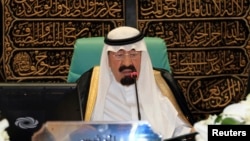Saudi Arabia has joined other Gulf Arab states in cautiously welcoming a nuclear deal between Iran and a group of world powers.
The Saudi government said the agreement "could be" a first step toward a comprehensive solution to the Iranian nuclear dispute, "provided there is goodwill."
2012
2013
Under the deal signed in Geneva on Sunday, Iran agrees to limit or freeze parts of its nuclear program for six months. In return, the United Nations Security Council and six world powers will ease some sanctions on the Iranian economy.
The negotiations have strained relations between Saudi Arabia and the United States in recent months.
Sunni Arab Gulf nations have long feared that Iran will divert its nuclear activities to make atomic weapons, enabling the Shi'ite-majority nation to boost its regional influence at the expense of Sunnis. Iran maintains its nuclear program is peaceful.
During a Monday speech in San Francisco, President Barack Obama credited the deal with Iran to what he calls clear-eyed and principled diplomacy and unprecedented sanctions.
He said if Iran seizes the opportunity to join the global community, the U.S. can begin to chip away at the mistrust that has existed with Iran for decades.
French Foreign Minister Laurent Fabius said Monday the European Union could lift some sanctions against Iran next month. But he told French radio that any easing will be "limited, targeted and reversible."
Israeli Prime Minister Benjamin Netanyahu said he is sending a national security team to Washington in the coming days to consult with the Obama administration on a permanent resolution to the Iranian nuclear dispute. Netanyahu calls the Geneva agreement a "historic mistake" because it allows Iran to maintain nuclear facilities that could be weaponized in the future. Israeli leaders see a nuclear-armed Iran as a threat to their nation's existence because of Iran's frequent calls for Israel's demise.
Monday's Saudi statement said the Geneva agreement should be followed by a comprehensive solution that "leads to the removal of weapons of mass destruction, especially nuclear, from the Middle East." Riyadh also called for unspecified further steps to "guarantee a right of all states in the region to use nuclear power peacefully."
Four other Gulf states also issued statements expressing hope that the Iran nuclear deal will safeguard regional peace and stability. Those nations include Bahrain, Kuwait, Qatar and the United Arab Emirates.
The Saudi government said the agreement "could be" a first step toward a comprehensive solution to the Iranian nuclear dispute, "provided there is goodwill."
Recent Developments in Iran Nuclear Agreement
Recent Developments in Iran Nuclear Agreement:2012
- January: International Atomic Energy Agency [IAEA] confirms Iran is refining uranium to 20% fissile purity.
- February: UN inspectors end talks in Tehran without inspecting disputed military site at Parchin.
- April: Iranian President Mahmoud Ahmadinejad vows Iran will not surrender its nuclear rights.
- May: UN inspectors report they found find traces significantly upgraded uranium at an Iranian site.
- July: EU begins total ban on Iranian oil imports; US expands sanctions.
- September: IAEA demands access to Parchin; Iran calls EU sanctions "irresponsible."
- December: IAEA says it makes progress in talks with Iran. US imposes more sanctions.
2013
- January: Iran says it will speed up nuclear fuel work.
- February: Iran's supreme leader Ayatollah Ali Khamenei rejects direct nuclear talks with the U.S. Iran and world powers meet, agree to more talks.
- May: IAEA says Iran has expanded nuclear activity.
- September: Iranian President Hassan Rouhani says Iran will not seek weapons of mass destruction. Iran and world powers agree to resume nuclear talks.
- October: Iran holds talks with five permanent members of U.N. Security Council and Germany.
- November: Iran agrees to limit or freeze parts of its nuclear program for six months in return for the easing of some sanctions.
The negotiations have strained relations between Saudi Arabia and the United States in recent months.
Sunni Arab Gulf nations have long feared that Iran will divert its nuclear activities to make atomic weapons, enabling the Shi'ite-majority nation to boost its regional influence at the expense of Sunnis. Iran maintains its nuclear program is peaceful.
During a Monday speech in San Francisco, President Barack Obama credited the deal with Iran to what he calls clear-eyed and principled diplomacy and unprecedented sanctions.
He said if Iran seizes the opportunity to join the global community, the U.S. can begin to chip away at the mistrust that has existed with Iran for decades.
French Foreign Minister Laurent Fabius said Monday the European Union could lift some sanctions against Iran next month. But he told French radio that any easing will be "limited, targeted and reversible."
Israeli Prime Minister Benjamin Netanyahu said he is sending a national security team to Washington in the coming days to consult with the Obama administration on a permanent resolution to the Iranian nuclear dispute. Netanyahu calls the Geneva agreement a "historic mistake" because it allows Iran to maintain nuclear facilities that could be weaponized in the future. Israeli leaders see a nuclear-armed Iran as a threat to their nation's existence because of Iran's frequent calls for Israel's demise.
Monday's Saudi statement said the Geneva agreement should be followed by a comprehensive solution that "leads to the removal of weapons of mass destruction, especially nuclear, from the Middle East." Riyadh also called for unspecified further steps to "guarantee a right of all states in the region to use nuclear power peacefully."
Four other Gulf states also issued statements expressing hope that the Iran nuclear deal will safeguard regional peace and stability. Those nations include Bahrain, Kuwait, Qatar and the United Arab Emirates.












